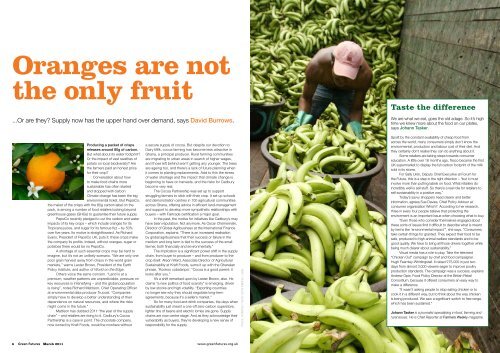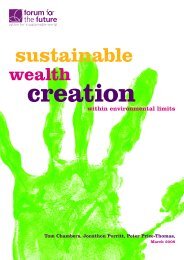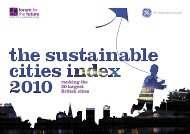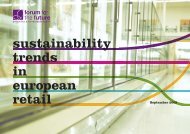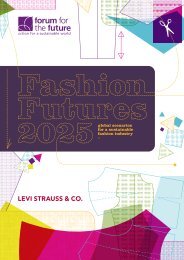TOMORROW'S FOOD, TOMORROW'S FARMS - Forum for the Future
TOMORROW'S FOOD, TOMORROW'S FARMS - Forum for the Future
TOMORROW'S FOOD, TOMORROW'S FARMS - Forum for the Future
You also want an ePaper? Increase the reach of your titles
YUMPU automatically turns print PDFs into web optimized ePapers that Google loves.
Oranges are not<br />
<strong>the</strong> only fruit<br />
...Or are <strong>the</strong>y? Supply now has <strong>the</strong> upper hand over demand, says David Burrows.<br />
6 Green <strong>Future</strong>s March 2011<br />
Producing a packet of crisps<br />
releases around 80g of carbon.<br />
But what about its water footprint?<br />
Or <strong>the</strong> impact of vast swa<strong>the</strong>s of<br />
potato on local biodiversity? Are<br />
<strong>the</strong> farmers paid an honest price<br />
<strong>for</strong> <strong>the</strong>ir crop?<br />
Conversation about how<br />
to make food chains more<br />
sustainable has often started<br />
and stopped with carbon.<br />
Climate change has been <strong>the</strong> big<br />
environmental ticket. But PepsiCo,<br />
<strong>the</strong> maker of <strong>the</strong> crisps with <strong>the</strong> 80g carbon label on <strong>the</strong><br />
pack, is among a number of food retailers looking beyond<br />
greenhouse gases (GHGs) to guarantee <strong>the</strong>ir future supply.<br />
PepsiCo recently pledged to cut <strong>the</strong> carbon and water<br />
impacts of its key crops – which include oranges <strong>for</strong> its<br />
Tropicana juices, and sugar <strong>for</strong> its famous fizz – by 50%<br />
over five years. Its motive is straight<strong>for</strong>ward. As Richard<br />
Evans, President of PepsiCo UK, puts it: <strong>the</strong>se crops make<br />
<strong>the</strong> company its profits. Indeed, without oranges, sugar or<br />
potatoes <strong>the</strong>re would be no PepsiCo.<br />
A shortage of such essential crops may be hard to<br />
imagine, but it’s not an unlikely scenario. “We are only one<br />
poor grain harvest away from chaos in <strong>the</strong> world grain<br />
markets,” warns Lester Brown, President of <strong>the</strong> Earth<br />
Policy Institute, and author of World on <strong>the</strong> Edge.<br />
O<strong>the</strong>rs voice <strong>the</strong> same concern. “Land is at a<br />
premium, wea<strong>the</strong>r patterns are unpredictable, pressure on<br />
key resources is intensifying – and <strong>the</strong> global population<br />
is rising”, notes Richard Mattison, Chief Operating Officer<br />
at environmental data producer Trucost. “Companies<br />
simply have to develop a better understanding of <strong>the</strong>ir<br />
dependence on natural resources, and where <strong>the</strong> risks<br />
might come in <strong>the</strong> future.”<br />
Mattison has dubbed 2011 “<strong>the</strong> year of <strong>the</strong> supply<br />
chain” – and retailers are rising to it. Cadbury’s Cocoa<br />
Partnership is a case in point. The chocolate company,<br />
now owned by Kraft Foods, would be nowhere without<br />
a secure supply of cocoa. But despite our devotion to<br />
Dairy Milk, cocoa farming has become less attractive in<br />
Ghana, a principal producer. Rural farming communities<br />
are migrating to urban areas in search of higher wages,<br />
and those left behind aren’t getting any younger. The trees<br />
are ageing too, and <strong>the</strong>re’s a lack of future planning when<br />
it comes to planting replacements. Add to this <strong>the</strong> stress<br />
of water shortage and <strong>the</strong> impact that climate change is<br />
beginning to have on harvests, and <strong>the</strong> risks <strong>for</strong> Cadbury<br />
become very real.<br />
The Cocoa Partnership was set up to support<br />
struggling farmers to stick with <strong>the</strong>ir crop. It set up schools<br />
and demonstration centres in 100 agricultural communities<br />
across Ghana, offering advice in efficient land-management<br />
and support to develop more sympa<strong>the</strong>tic relationships with<br />
buyers – with Fairtrade certification a major goal.<br />
In <strong>the</strong> past, <strong>the</strong> motive <strong>for</strong> initiatives like Cadbury’s may<br />
have been reputation. Not anymore. As Oscar Chemerinski,<br />
Director of Global Agribusiness at <strong>the</strong> International Finance<br />
Corporation, explains: “There is an increased realisation<br />
by global agribusiness that <strong>the</strong>ir success or failure in <strong>the</strong><br />
medium and long term is tied to <strong>the</strong> success of <strong>the</strong> small<br />
farmer, both financially and environmentally.”<br />
The implication is a significant power shift in <strong>the</strong> supply<br />
chain, from buyer to producer – and from producer to <strong>the</strong><br />
crop itself. Alison Ward, Associate Director of Agricultural<br />
Sustainability at Kraft Foods, sums it up with <strong>the</strong> Ghanaian<br />
phrase, ‘Kookoo cobatanpa’: “Cocoa is a good parent; it<br />
looks after you.”<br />
It’s a shift remarked upon by Lester Brown, also. He<br />
claims “a new politics of food scarcity” is emerging, driven<br />
by low stocks and high volatility. “Exporting countries<br />
no longer see why <strong>the</strong>y should negotiate long-term<br />
agreements, because it’s a seller’s market.”<br />
So <strong>for</strong> many food and drink companies, <strong>the</strong> days when<br />
sustainability just meant a one-off zero-carbon superstore,<br />
lighter tins of beans and electric lorries are gone. Supply<br />
chains are now centre stage. And as <strong>the</strong>y acknowledge <strong>the</strong>ir<br />
vulnerability as buyers, <strong>the</strong>y’re developing a new sense of<br />
responsibility <strong>for</strong> <strong>the</strong> supply.<br />
www.greenfutures.org.uk<br />
Photos: richterfoto / istock; Elmer Martinez / Getty<br />
Taste <strong>the</strong> difference<br />
We are what we eat, goes <strong>the</strong> old adage. So it’s high<br />
time we knew more about <strong>the</strong> food on our plates,<br />
says Johann Tasker.<br />
Spoilt by <strong>the</strong> constant availability of cheap food from<br />
across <strong>the</strong> world, many consumers simply don’t know <strong>the</strong><br />
environmental, production and labour cost of <strong>the</strong>ir diet. And<br />
<strong>the</strong>y certainly don’t realise <strong>the</strong>y can do anything about it.<br />
Some retailers are taking steps towards consumer<br />
education. A little over 18 months ago, Tesco became <strong>the</strong> first<br />
UK supermarket to display <strong>the</strong> full carbon footprint of <strong>the</strong> milk<br />
sold in its stores.<br />
For Sally Uren, Deputy Chief Executive at <strong>Forum</strong> <strong>for</strong><br />
<strong>the</strong> <strong>Future</strong>, this is a step in <strong>the</strong> right direction – “but it must<br />
involve more than putting labels on food. What retailers do<br />
incredibly well is sell stuff. So <strong>the</strong>re’s a real role <strong>for</strong> retailers to<br />
sell sustainability in a positive way.”<br />
Today’s savvy shoppers need clearer and better<br />
in<strong>for</strong>mation, agrees Sue Davies, Chief Policy Advisor at<br />
consumer organisation Which?. According to her research,<br />
three in every four people believe that protecting <strong>the</strong><br />
environment is an important issue when choosing what to buy.<br />
“Even those who consider <strong>the</strong>mselves engaged about<br />
<strong>the</strong>se sorts of issues find it difficult to describe what is meant<br />
by terms like ‘environmental impact’”, she says. “Consumers<br />
take certain things <strong>for</strong> granted. They expect <strong>the</strong>ir food to be<br />
safe, produced to high animal welfare standards and to be<br />
good quality. We have to bring all those drivers toge<strong>the</strong>r while<br />
being much clearer about sustainability.”<br />
Visual media has a role to play. Take <strong>the</strong> televised<br />
“Chicken Out” campaign by chef and food campaigner<br />
Hugh Fearnley-Whittingstall. It raised £75,000 in just two<br />
days from almost 3,000 viewers eager to improve poultry<br />
production standards. The campaign was a success, explains<br />
Andrew Opie, Food Policy Director at <strong>the</strong> British Retail<br />
Consortium, because it offered consumers an easy way to<br />
make a difference.<br />
“It wasn’t asking people to stop eating chicken or to<br />
cook it in a different way, but to think about <strong>the</strong> way chicken<br />
is being produced. We saw a significant switch to free range,<br />
which has been sustained.”<br />
Johann Tasker is a journalist specialising in food, farming and<br />
rural issues. He is Chief Reporter at Farmers Weekly magazine.


